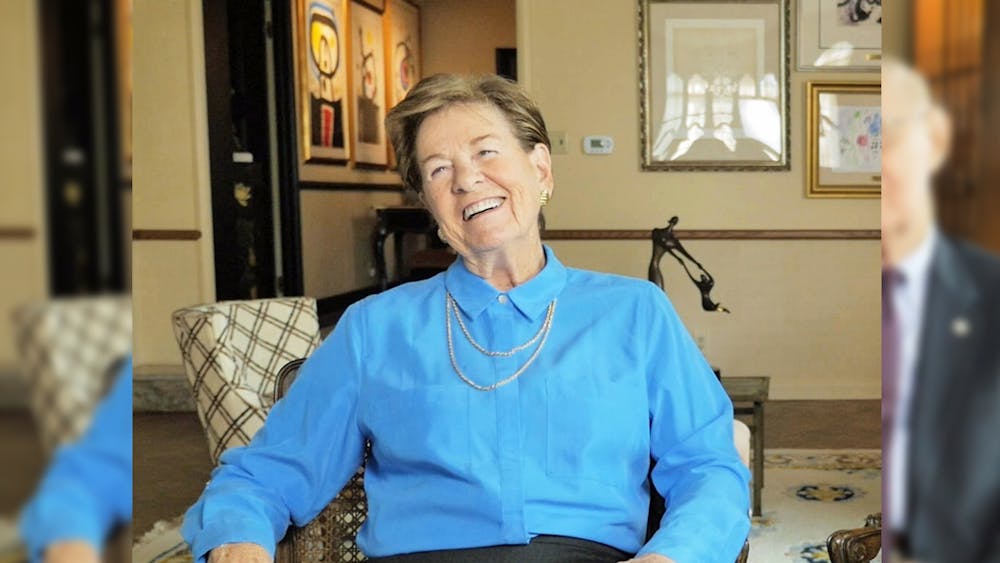During its initial wave of productions in the early 1970s, many theaters banned Peter Schaffer's "Equus." With full frontal nudity, implied bestiality and an act of ghastly mutilation, the Tony award-winning play ruffled more than a few feathers.\n"It's a brutal work, shockingly violent, very disturbing," said professor Murray McGibbon, who directs the University Theatre production opening Friday. "It's a raw piece of total theater. Schaffer stripped away all of the theatrical artifice, leaving a work that haunts and resonates."\nSet in a mental hospital ward, "Equus" concerns the efforts of psychiatrist Martin Dysart to pry into the mind of the 17-year-old Alan Strang, who inexplicably blinded six horses with a metal spike. At first, the boy refuses to speak to Dysart, who holds reservations about his own psychological well-being. Instead, Alan just sings television jingles to himself like a lunatic.\nAs Dysart gradually gets the boy to open up, he learns of an intense relationship Alan had with a horse named Nugget, a relationship part sexual and part spiritual. The son of a Marxist father and Christian mother, Alan transferred his belief in God into a kind of equine paganism.\nAfter secretively riding Nugget every night after he got done with his work at the stable, Alan suffered a nervous breakdown that led to the act of horrible violence. In their conversations, Dysart comes to respect Alan's spirituality and primitivism. He becomes almost afraid to treat the boy, fearing he may "destroy his passion." \n"I have certainly found the role of Alan Strang a difficult one," said junior Bradley Fletcher. "Trying to understand and show such drastic changes in passion and pain all inside one boy is a fight. I've never run across a role in performance or reading that is similar. Coming from a background of mostly comic roles, this is especially difficult."\nBut Fletcher said he spared no pains in his preparation.\n"To understand Alan, I had to do everything from thinking about what he eats for breakfast, to creating in my mind an elaborate image and vision of one of his nights out riding the horse," he said. \n"When you have to account for all the factors that add up to make Alan go through with this terrible act, it demands knowing everything you can. I had been thinking about about all these factors from the moment I first saw the notice for auditions."\nSenior Erik Anderson, who play Dysart, came in well prepared.\nHe's sunk his teeth into weighty roles before, such as that of Eddie in a production of "Hurlyburly" in New York City. But he said he still found "Equus" challenging.\n"From a technical standpoint, there's not a lot of action," he said. "As a character, you never leave the stage. And then, I'm 23 and I have to explore the psyche of a middle-aged man. So yeah, it's a demanding role."\nFrom the springboard of its jarring subject matter, "Equus" launches into a critique of the conventions of society and psychiatry. It calls into question how deviation from the norms is handled.\nAnd that's why McGibbon said he decided to stage it. \n"It's a very powerful dramatic experience," he said. "People now associate theater with comedy and fancy trappings like moving scenery. This play gets back to the roots of theater, why it existed in the first place -- man's need to express himself. It gives the audience something more to think about than what they'll have to drink afterward." \nMcGibbon, who hails from South Africa, flat-out said he thinks modern theater has lost its way.\n"The American economic outlook is good, but the artistic indicators have all gone south," he said. "In South Africa, there's widespread poverty and enormous political hardship that makes the artist hungry. It gives meat for him to wrestle for."\nAnd the cast has confidence in McGibbon's vision of the play as an eye-opener, a means to shake the audience from its complacency. \n"Murray has shaped this play into a form that will make it more real than any theater that most audience members have ever seen," he said. "I think the casual theatergoer will be shocked by much of the play. This production doesn't stay within safe boundaries, because life doesn't stay within safe boundaries.\n"It dares to be real. I think any mature audience member who gives this show a chance will be rewarded by it's power and ability to strike your mind and emotions."\n"Equus" plays Oct. 6, and 9-14 at the University Theatre. Curtain time for all shows is 8 p.m. Tickets for all performances are $11.50 and $10.50 for students and seniors. For ticket information, call (812) 855-1103.\n"Equus" contains adult language, adult situations and nudity.
'Equus' confronts weighty themes
Get stories like this in your inbox
Subscribe





